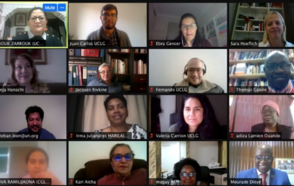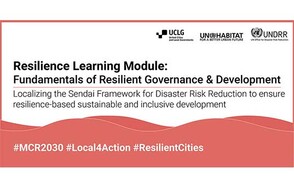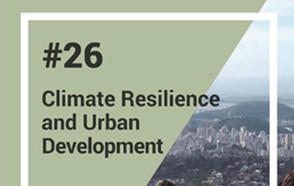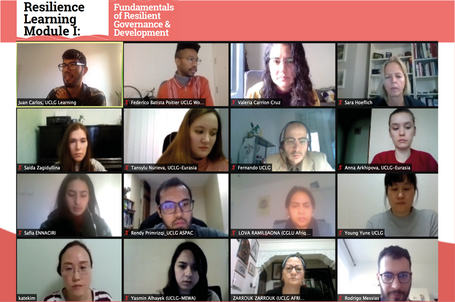
The UCLG’s Learning team held a 3-day workshop from 2-4 December to provide training for the facilitation of the Resilience Learning Module to its different sections. The workshop was carried out for representatives of UCLG- ASPAC, MEWA, Eurasia, Africa, Europe, CUF, and Metropolis. The virtual sessions covered the fundamentals of resilient governance and development through a hybrid methodology of lectures, interactive exercises and learning games.
Sharing new tool with learning forum– regional section trainers
The workshop was designed for section representatives who are actively engaged in capacity building and facilitation of workshops. Its primary purpose was for them to get familiar with the Resilience Learning module and its contents so they can proceed to organize, adapt, and facilitate workshops within their sections and target member cities and municipality employees. Unlike past years, this ToT session was adapted to a virtual format given the pandemic and travel restrictions. Nevertheless, a highly productive and dynamic process made it a remarkable experience for everyone.
The practical side of resilience in cities – localizing the Sendai Framework
On the first day, participants started getting familiar with Mural, the digital whiteboard and collaborative platform, through an introduction exercise to get to know about each other. Afterwards, a lecture about the key concepts of risk and resilience was shared, and it was reinforced with a group exercise reflecting on these terms with sample city profiles such as Maputo, Chefchaouen, and Yakutsk. In a similar format, the session continued with a lecture on resilience, synergies, and localization of the Sendai Framework and the rest of the global agendas. The day ended with an exercise focusing on the linkage with the SDGs in the same sample cities previously worked on.
Resilience is about the long-term vision: thinking about the cost of doing nothing
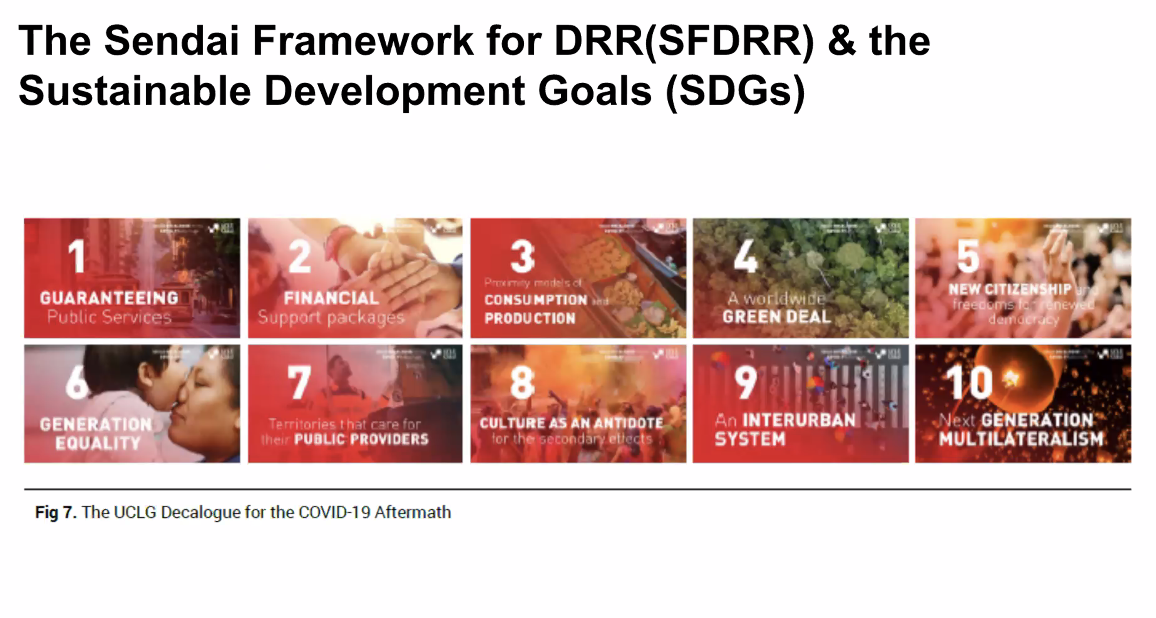 The second day consisted of an overview of the Fundamentals of Resilience Building with a lecture about resilience principles, governance, and assessments along with successful case studies shared at the beginning. Then, Futurilities, the flagship dynamic of the module, was introduced. This interactive role-playing game invites participants to reflect on the long-term costs of business as usual and the benefits of investing in resilience. The dynamic consists of a mayor and its team of secretariats facing different stresses in their city and having to decide on a range of investment options along three different stages between 2020 and 2100. Participants are encouraged to think of the possible short, medium, and long-term impacts considering financial, socio-economical, and environmental factors. Based on their decisions, plausible scenarios are shown, and a variety of outcomes in the different groups fostered insightful reflections on the decision-making process of local and regional governments. Among them, the need for appropriate assessments that consider future climate trends, as well for innovative financing mechanisms and collaboration across levels of government. This reflection was followed by a lecture on financing, strategies, and actions plans, including a featured case study from Jakarta’s resilience strategy presented by Rendy Primrizqi (UCLG ASPAC).
The second day consisted of an overview of the Fundamentals of Resilience Building with a lecture about resilience principles, governance, and assessments along with successful case studies shared at the beginning. Then, Futurilities, the flagship dynamic of the module, was introduced. This interactive role-playing game invites participants to reflect on the long-term costs of business as usual and the benefits of investing in resilience. The dynamic consists of a mayor and its team of secretariats facing different stresses in their city and having to decide on a range of investment options along three different stages between 2020 and 2100. Participants are encouraged to think of the possible short, medium, and long-term impacts considering financial, socio-economical, and environmental factors. Based on their decisions, plausible scenarios are shown, and a variety of outcomes in the different groups fostered insightful reflections on the decision-making process of local and regional governments. Among them, the need for appropriate assessments that consider future climate trends, as well for innovative financing mechanisms and collaboration across levels of government. This reflection was followed by a lecture on financing, strategies, and actions plans, including a featured case study from Jakarta’s resilience strategy presented by Rendy Primrizqi (UCLG ASPAC).
Local Government Associations are critical for a global agenda on resilience
On the last day of the workshop, the main topic was about the key role and action lines of Local and Regional Government Associations (LRGAs). The contribution of section representatives and trainers was crucial to the discussion as the exercise revolved around their work to support local and regional processes for resilience building and DRR at different stages. The workshop was highly successful due to the high level of interest, participation, and engagement from our trainers, to learn about the module and adapt the chapters and lectures to their members’ needs.
The UCLG Learning team, together with UCLG sections, consultation mechanisms, and partners, will continue to roll out the module with different Training of Trainers sections, including Spanish and French versions, and a second volume to be published in 2021.
- Download the new Resilience Learning Module focuses on key role of local governance for DRR and Resilience Building here.











